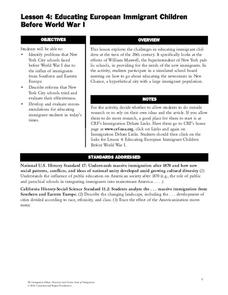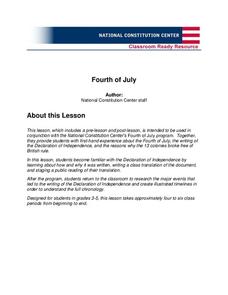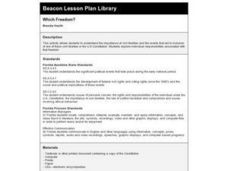Curated OER
The Constitution
Eighth graders conduct research about the weaknesses of the Articles of Confederation, the Virginia Plan, the New Jersey Plan, the Connecticut (Great) Compromise, and the 3/5 Compromise.
Curated OER
Executive Orders
Students interpret historical evidence presented in primary and secondary resources. In this foreign policy lesson, students examine U.S. foreign policies of Presidents since World War II. Students prepare PowerPoint...
Curated OER
Racial Inequality: Remnants of a Troubled Time
Eighth graders study the ratification of the 14th Amendment and the Plessy v. Ferguson decision. In this US History lesson, 8th graders read excerpts from the Brown v. Board of education decision. Students investigate one of...
Curated OER
Human Rights in the Philippines
Students examine the meaning of human rights under the United Nations system, in the U.S., and the Philippines. They conduct research, discuss the concepts in groups, and conduct a debate on the human rights situation post Marcos...
Curated OER
You Gotta Know the Territory
Young scholars examine the relationship between Native Americans and those who settled the Iowa territory. In this Iowa history activity, students investigate the process for settling the territory and how intercultural relationships...
Curated OER
Early Presidents and Politics
Students investigate early presidents of the United States. Students complete a series of lessons in which they research the contributions and political climate during the terms of U.S. presidents from George Washington to Andrew Jackson.
Curated OER
Progressivism (6)
In this online interactive American history worksheet, students answer 15 fill in the blank questions regarding the Progressive Movement. Students may submit their answers to be scored.
Curated OER
Slavery and the Legal Status of Free Blacks
Students examine the status of free blacks in Illinois and slavery in the U.S. They read and analyze primary source documents, answer and discuss questions, participate in a group discussion, and present the group's findings to the class.
Stanford University
Civil Rights or Human Rights?
Young citizens consider the American civil rights movement as part of the global struggle for human rights. After using a timeline activity to learn about the major events in the civil rights movement, class members study...
Constitutional Rights Foundation
Educating European Immigrant Children Before World War I
As if surviving a journey to America wasn't enough of a feat for early 20th century immigrants, they then needed to settle into American life. Learn about the ways New York public education attempted to meet the needs of its students,...
Curated OER
Discovering American Symbols
Help youngsters get to know their states and capitals, explore their own country, and study American symbolism. They take a "trip" across America collecting symbols, images, and information about each state as they go (through text and...
National Constitution Center
Fourth of July (Grades 3-5)
Bring history to life for your young scholars with a Fourth of July lesson series. After a class reading of the Declaration of Independence, students translate this pivotal document into layman's terms before working in small...
Curated OER
The Federalist Debates: Balancing Power Between State and Federal Governments
Middle schoolers examine the pros and cons of state sovereignty vs. federalism, as argued by the Founding Fathers. They identify the basic positions of each side, complete a worksheet, and write a persuasive essay arguing for Jefferson...
Curated OER
The Bill of Rights in Current Events
Divided the class into pairs, each group is assigned one of the amendments. They use the internet to research current cases and issues involving their amendment. They are then lead into the introduction to some of the basic concepts of...
Curated OER
Which Freedom?
Fourth graders choose on the freedoms in the Bill of Rights and research it on the internet. They answer specific questions using their research and produce a written document using a computer.
Curated OER
The Pledge of Allegiance
Students study the history of the Pledge of Allegiance. They investigate the First Amendment concept of separation of Church and state using Internet resources.
Curated OER
Philanthropy in History Lesson 1: We the People Hall of Fame
Students examine the lives of people who contributed to the common good, and democracy. They investigate grievances that lead to the call for American independence and look at the costs that are incurred as a result of personal acts of...
Curated OER
Race and Voting in the Segregated South
Students examine the history of African American voting rights. In this voting rights lesson, students listen to a lecture on African American voting rights between the years 1890 and 1965. Students respond to discussion questions...
Curated OER
The Gas Laws
A couple of gas law charts and the history of the gas laws constitute this presentation. Notes are included for the slide that illustrates how to perform gas law calculations. This is a simple collection, a visual aid enhance to your...
Curated OER
The National Women's Party and the Enfranchisement of Black Women
Students analyze the attitudes and hostility given to African-American women within the National Women's Party. They finish the activity by examining another moment in the party's history and writing about it.
Curated OER
Reparations for Slavery
Young scholars analyze slavery reparations. In this American history instructional activity, students examine the pros and cons of paying reparations for slavery and participate in a discussion.
Curated OER
Understanding Tax: Your Role as a Tax Payer
Every adult should know that it is their responsibility to help fund public goods and services by paying taxes. Help young people get a handle on the history, evolution, purposes for, and reasons why they should pay taxes too.
Curated OER
Democratic Process, Constitutional Issues, Local Government
Twelfth graders engage in the decision making process so as to encourage them to become active citizens upon graduation from high school.
Curated OER
What Is Democracy?
Students explore the concept of democracy. They define and describe democracy and choose an issue they believe the government should care about for its people. They write a persuasive essay about their issue.

























